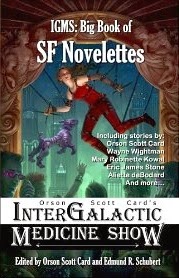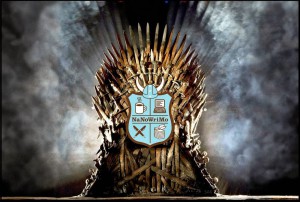So the latest Facebook meme is the #bookbucketchallenge (a take-off of the Ice Bucket Challenge). You may have seen it. Perhaps one (or more) of your friends have posted the challenge on their wall:
“List 10 books that have stayed with you in some way. Don’t take more than a few minutes, and don’t think too hard. They do not have to be the ‘right’ books or great works of literature, just ones that have affected you in some way.”
I’m pleased to report that based on the results of the survey that researchers Lada Adamic and Pinkesh Patel have compiled (and that you can find some helpful infographics of here) we can officially declare the ascendancy of geek culture.
That’s right: the war is over. We won.
How can I say this? Well, of the Top 10 books that “stayed” with people, six of them are sci-fi or fantasy:
01 21.08* Harry Potter series – J.K. Rowling
02 14.48 To Kill a Mockingbird – Harper Lee
03 13.86 The Lord of the Rings – JRR Tolkien
04 7.48 The Hobbit – JRR Tolkien
05 7.28 Pride and Prejudice – Jane Austen
06 7.21 The Holy Bible
07 5.97 The Hitchhiker’s Guide to the Galaxy – Douglas Adams
08 5.82 The Hunger Games Trilogy – Suzanne Collins
09 5.70 The Catcher in the Rye – J.D. Salinger
10 5.63 The Chronicles of Narnia – C.S. Lewis
If we look at the Top 20 that number grows to eleven. Out of the 100 books listed, thirty-five or thirty-six of them would be considered SF & F–nearly a quarter of them
You’re welcome, world. You’re welcome.
The Full List
01 21.08* Harry Potter series – J.K. Rowling
02 14.48 To Kill a Mockingbird – Harper Lee
03 13.86 The Lord of the Rings – JRR Tolkien
04 7.48 The Hobbit – JRR Tolkien
05 7.28 Pride and Prejudice – Jane Austen
06 7.21 The Holy Bible
07 5.97 The Hitchhiker’s Guide to the Galaxy – Douglas Adams
08 5.82 The Hunger Games Trilogy – Suzanne Collins
09 5.70 The Catcher in the Rye – J.D. Salinger
10 5.63 The Chronicles of Narnia – C.S. Lewis
11 5.61 The Great Gatsby – F. Scott Fitzgerald
12 5.37 1984 – George Orwell
13 5.26 Little Women – Louisa May Alcott
14 5.23 Jane Eyre – Charlotte Bronte
15 5.11 The Stand – Stephen King
16 4.95 Gone with the Wind – Margaret Mitchell
17 4.38 A Wrinkle in Time – Madeleine L’Engle
18 4.27 The Handmaid’s Tale – Margaret Atwood
19 4.05 The Lion, the Witch, and the Wardrobe – C.S. Lewis
20 4.01 The Alchemist – Paulo Coelho
21 3.95 Anne of Green Gables – L.M. Montgomery
22 3.88 The Giver – Lois Lowry
23 3.67 The Kite Runner – Khaled Hosseini
24 3.53 Ender’s Game – Orson Scott Card
25 3.39 The Poisonwood Bible – Barbara Kingsolver
26 3.38 Lord of the Flies – William Golding
27 3.38 The Eye of the World – Robert Jordan
28 3.32 The Book Thief by Markus Zusak
29 3.26 Wuthering Heights – Emily Bronte
30 3.22 Hamlet – William Shakespeare
31 3.21 The Little Prince – Antoine de Saint-Exupery
32 3.15 Sherlock Holmes – Sir Arthur Conan Doyle
33 3.15 Fahrenheit 451 – Ray Bradbury
34 3.12 Animal Farm – George Orwell
35 3.08 The Book of Mormon
36 3.05 The Diary of Anne Frank – Anne Frank
37 3.02 Dune – Frank Herbert
38 2.98 One Hundred Years of Solitude – Gabriel Garcia Marquez
39 2.83 The Autobiography of Malcolm X
40 2.78 Of Mice and Men – John Steinbeck
41 2.72 The Giving Tree – Shel Silverstein
42 2.68 The Fault in Our Stars – John Green
43 2.68 On the Road – Jack Kerouac
44 2.58 Lamb – Christopher Moore
45 2.54 Slaughterhouse Five – Kurt Vonnegut
46 2.53 A Prayer for Owen Meany – John Irving
47 2.52 Good Omens – Neil Gaiman and Terry Pratchett
48 2.45 The Help – Kathryn Stockett
49 2.44 The Outsiders – S.E. Hinton
50 2.42 American Gods – Neil Gaiman
51 2.41 Where the Red Fern Grows – Wilson Rawls
52 2.39 Stranger in a Strange Land – Robert Heinlein
53 2.38 The Secret Garden – Frances Hodgson Burnett
54 2.35 Little House on the Prairie – Laura Ingalls Wilder
55 2.31 The Count of Monte Cristo – Alexandre Dumas
56 2.31 Pillars of the Earth – Ken Follett
57 2.29 The Da Vinci Code – Dan Brown
58 2.24 Brave New World – Aldous Huxley
59 2.21 A Tale of Two Cities – Charles Dickens
60 2.21 Les Miserables – Victor Hugo
61 2.16 Great Expectations – Charles Dickens
62 2.12 Night – Elie Wiesel
63 2.12 The Dark Tower Series – Stephen King
64 2.07 Outlander – Diana Gabaldon
65 1.92 The Color Purple – Alice Walker
66 1.89 A Thousand Splendid Suns – Khaled Hosseini
67 1.88 The Art of War – Sun Tzu
68 1.85 Catch 22 – Joseph Heller
69 1.85 The Bell Jar – Sylvia Plath
70 1.83 The Perks of Being a Wallflower – Stephen Chbosky
71 1.78 The Old Man and the Sea – Ernest Hemingway
72 1.76 Memoirs of a Geisha – Arthur Golden
73 1.75 Tuesdays with Morrie – Mitch Albom
74 1.73 The Road – Cormac McCarthy
75 1.72 Watership Down – Richard Adams
76 1.72 A Tree Grows in Brooklyn – Betty Smith
77 1.68 Where the Sidewalk Ends – Shel Silverstein
78 1.65 The Girl with the Dragon Tattoo – Stieg Larsson
79 1.65 A Song of Ice and Fire – George R. R. Martin
80 1.65 Are You There God? It’s Me, Margaret – Judy Blume
81 1.64 Charlotte’s Web – E.B. White
82 1.63 The Time Traveler’s Wife – Audrey Niffenegger
83 1.62 Anna Karenina – Leo Tolstoy
84 1.62 Crime and Punishment – Fyodor Dostoyevsky
85 1.61 The Adventures of Huckleberry Finn – Mark Twain
86 1.58 The Shack – William P. Young
87 1.56 Watchmen – Alan Moore
88 1.55 Interview with the Vampire – Anne Rice
89 1.54 The Odyssey – Homer
90 1.54 The House of the Spirits – Isabel Allende
91 1.53 The Stranger – Albert Camus
92 1.52 Call of the Wild – Jack London
93 1.51 The Five People You Meet in Heaven – Mitch Albom
94 1.51 Siddhartha – Herman Hesse
95 1.50 East of Eden – John Steinbeck
96 1.50 Matilda – Roald Dahl
97 1.49 The Picture of Dorian Gray – Oscar Wilde
98 1.47 Zen and the Art of Motorcycle Maintenance – Robert Pirsig
99 1.45 Love in the Time of Cholera – Gabriel Garcia Marquez
100 1.45 Where the Wild Things Are – Maurice Sendak
– S.
* The numerals between the book’s ranking and the title indicate the percentage of people who mentioned the books in their lists






